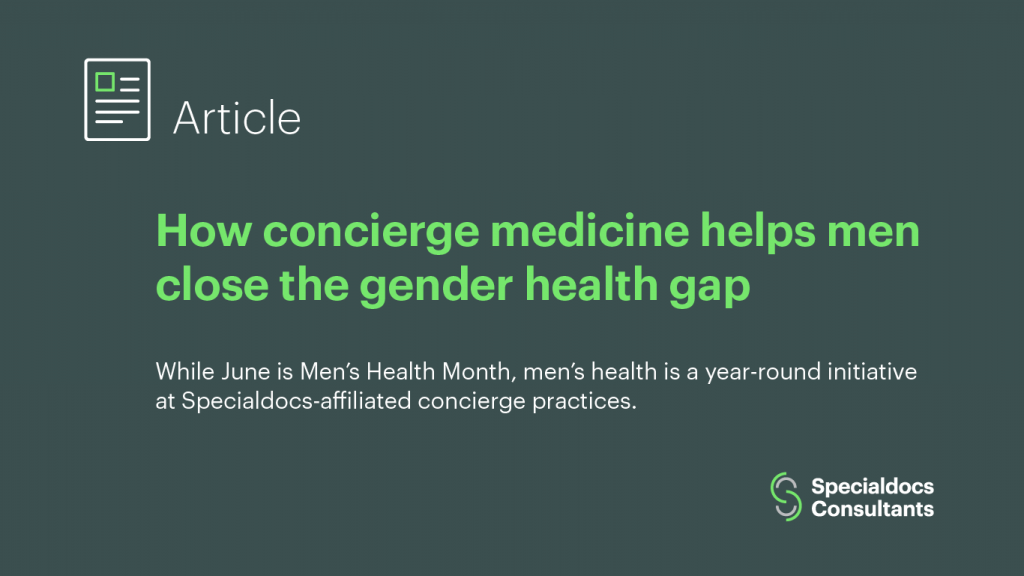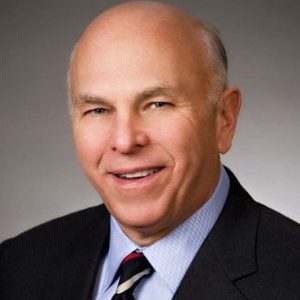
By Terry Bauer, CEO, Specialdocs Consultants
You may be aware that June is Men’s Health Month but, given its much more modest profile compared to October’s Breast Cancer Awareness Month or February’s American Heart Month, it’s understandable if you’re not. Yet, the issues raised and the need for greater awareness around cause and prevention is equally compelling.
Consider that American men live sicker and die younger than women, reflected in higher rates of mortality for virtually all of the leading causes of death in the U.S., including heart disease, cancer, stroke and suicide.1 Men are also much more likely to be hospitalized for pneumonia and long-term complications of diabetes. What connects all is a fact that is as true in today’s more enlightened times as it was decades ago: men are far less likely than women to have visited a doctor during the year. The most recent statistics lay it out starkly: 315 visits to the physician per 100 females vs. 239 visits per 100 males.2 That represents a great deal of missed opportunity for health screenings by an experienced doctor who may uncover conditions in their earlier, more treatable stages and help reduce the need for hospitalizations.
We know this can be achieved with a strong, trusted connection between patients and physicians who have the time to truly focus on preventive care, because it is in fact, happening every day at Specialdocs clients’ concierge practices across the country. There is no doubt that even in the unrushed environment of a membership-based practice, it can still be a challenge to overcome years of cultural conditioning and masculinity defined by phrases such as ‘big boys don’t cry,’ ‘play through the pain’ and ‘tough it out.’ Our physician clients are fully aware of the need to continually educate, motivate and inspire their male patients to visit regularly, and encourage them to openly share their fears and pain.
I’m thrilled to report that these physicians are making a real impact, with every extended patient visit, after-hours phone call, preventative screening and individualized plan of action for health and wellness. In recent visits to our physician clients offices’ nationwide, I was privileged to hear firsthand from many of their patients, both male and female, who are realizing the positive benefits of concierge care. Particularly gratifying was the strong connection felt by male patients, who frequently described their doctor as a family member or trusted friend, rarely heard praise from a gender known for their aversion to physicians.
“What I like the most about Dr. Brad Pontz is that he’s very responsive, approachable, very humane, very easy to talk to, like talking to an old friend,” shared Virginia patient Rene F. Similarly, Connecticut patient Steven N. described Matrix Personalized Medicine’s Dr. Larry Leibowitz as “more than a doctor to us. We consider him a true friend of the family.”(checking)
At Dr. Shalini Kaneriya’s DC-area practice, the fear factor experienced by many males is mitigated by the time taken to thoughtfully explore, develop a plan of action and continually monitor progress. Patient Tom C. notes appreciatively: “She listens, but she doesn’t just take what we say, she keeps asking questions, and listening until she figures out what’s going on. She’s always checking on us, checking labs, checking with other doctors we’re seeing.”
For Houston patient Scott B., who struggled with lifelong weight management issues and poorly controlled diabetes, joining the North Cypress Internal Medicine & Wellness concierge practice was the catalyst for tremendous improvements in his health. In his first year as a member, he was able to shed pounds, dramatically reduce his insulin and completely stop taking an additional oral medication for diabetes. “I’ve been dealing with diabetes for more than 20 years but no one had ever explained why or how to change my lifestyle to improve the condition. Working with Dr. Dorothy Serna and her wellness coaching team has literally saved my life.”
As we acknowledge Men’s Health Month, it’s heartening to see the progress being made on other fronts. Almost half of major hospitals now have men’s health centers, up from a third identified in 2014.3 Urologists are increasingly using patient visits frequently spurred by erectile dysfunction to look for warning signs of broader health problems and arrange appointments with the appropriate specialists if needed. Telemedicine is being used to make it easier for men to seek help from physicians without having to visit an office. Male-themed wellness fairs and health screenings at sporting events are also helping to overcome the well-known aversion to seeing doctors. Men’s Health Month itself continues to grow, recognized with official proclamations by more than 350 mayors and governors across the country. I applaud these, and all efforts made to improve the health of our communities.
But if given a choice, I can’t imagine a better way to give or receive care than in a Specialdocs affiliated concierge practice. As Stewart D, a patient at Northern Virginia Family Practice Associates, told us: “Our life is in their hands. They’re taking very good care of us. In fact, they take better care of me than I take care of myself at times.”
If you are interested in learning more about this highly rewarding model of care, I welcome your call anytime.
A happy and healthy Father’s Day to all!
1. Centers for Disease Control and Prevention and the National Center for Health Statistics, 2016
2. National Center for Healthcare Statistics, Data Brief, Jan. 2019
3. Wall St. Journal 5-30-19
 Terry Bauer is the CEO of Specialdocs Consultants. Terry’s vision of concierge medicine as an innovative and sustainable model for healthcare’s future began in 1999 when he first learned of the business from industry pioneers, and his interest in the sector continued to grow over the years. Learn more about Terry.
Terry Bauer is the CEO of Specialdocs Consultants. Terry’s vision of concierge medicine as an innovative and sustainable model for healthcare’s future began in 1999 when he first learned of the business from industry pioneers, and his interest in the sector continued to grow over the years. Learn more about Terry.
The post How concierge medicine helps men close the gender health gap appeared first on Specialdocs Consultants.
